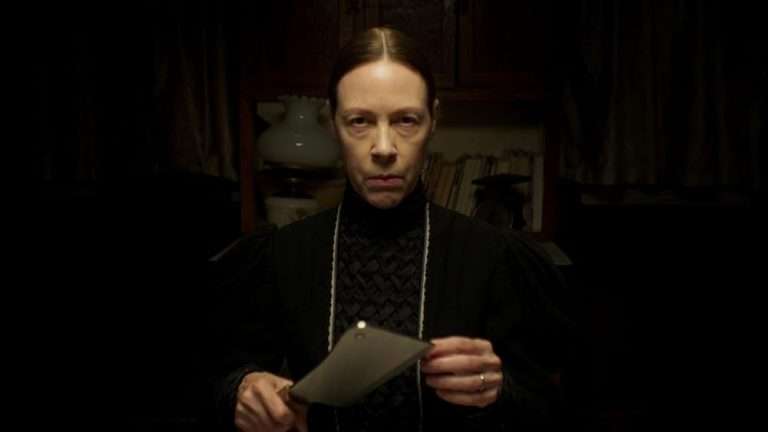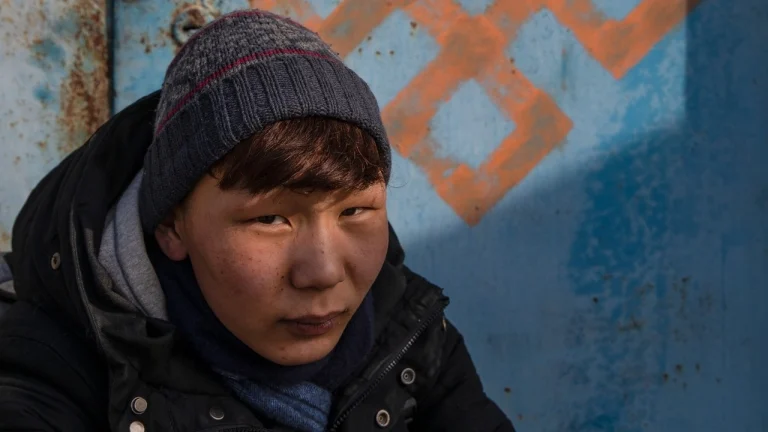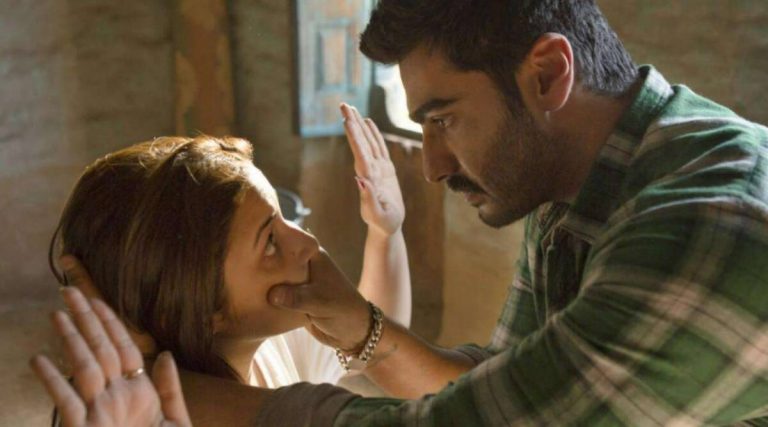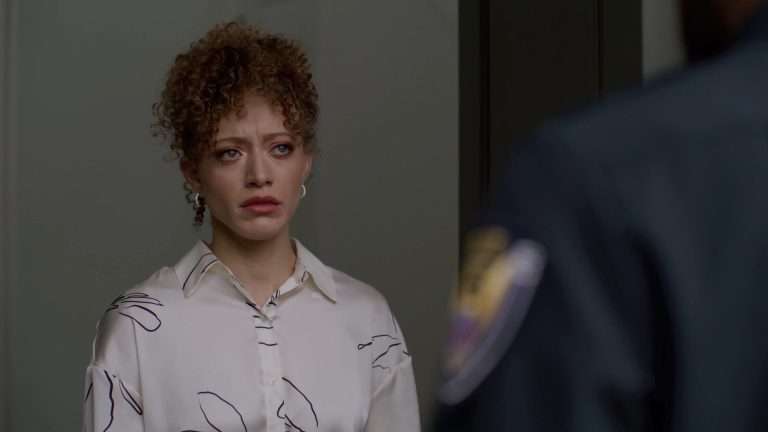An arid Syrian valley. Almost desolate except for a herd of sheep grazing slowly hither and thither. There, a woman returns to her abode from a daily errand to learn that her husband has brought home a young European girl (Vera Fay), clad in a burqa, to replace her (of course, in the bed). Expectedly, the woman – “Amuna” (Salha Nasraoui) – is soon ordered by her husband, “Aziz” (Salah Bensalah), to leave him for the first night with his newly bought/ brought (read whichever seems less disturbing to you) girl.
Outside amidst the windy night, Amuna can’t sleep. The constant murmur of a flag (emblem of an extremist militant organization of which Aziz is a follower) holds her back from falling asleep. The sound (as if) reflects the chaos going on in Amuna’s mind. She scrapes it from the pole and throws it away.
The next morning, engaged in a household chore, Amuna has her period. The camera focuses on her red-tinged finger. Under the scorching sun, the blood looks palpably red – validation of Amuna’s menstruation, which the makers perhaps wanted to show as a direct contradiction to superstitious Aziz’s claim that only a young girl can give him children (in a way rejecting Amuna’s ability to conceive and reducing her existence to a barren, worthless living being).
Amuna, when she returns home, finds Aziz standing on her mattress and fixing the torn-down, dusty flag. At the sight of Amuna, he haughtily asks, “Why was the flag on the ground? It has Allah’s name on it.” Amuna replies, “Don’t step on my mattress with your shoes” – a direct confrontation of wayward idealism and essential materialism. Daood Alabdulla and Louise Zenker’s 2025 short “Walud” explores this contradiction in a Syrian village controlled by ISIS, and situates the precarity of women in such societies, where male dominance is conjoined with and shaped by religious dogmas.
“Walud” orbits around this contradictory world where the patriarchal norms, married with religious dogmas, weigh heavily on the existence of women. While it doesn’t restrict itself to merely portraying the predicament, it takes on the task of reinstituting the feminine agency. It argues that the notion of women, as shown in the androcentric discourse, living as beings who have subordinated their lives to males, is nothing but a myth. Even in the hailstorm of patriarchy, women find camaraderie to unshackle themselves.
Also Read: The Return of ‘Chaotic Women’ in Indian Independent Cinema

To reify the feminine agency, “Walud” uses a few particular technical operations (a weapon that makes cinema an advanced medium). For example, Amuna, in a scene, unabashedly states that Aziz’s friend “Ahmed is a dirty dog” who “buys himself a wife with dirty money.” She, in an undaunting voice, asks Aziz, “How much does a woman cost? What did you do for them (for Aziz’s organisation) so that you could afford her?” (Alluding to the European girl whom Aziz has kidnapped).
In this scene, and in the scene where Amuna scrapes the flag, the camera shows her in a close shot, from a side-lower angle. The larger image of Amuna from the lower angle empowers the character, thus placing her in a position to counter Aziz’s dominance.
In the absence of Aziz, the kidnapped girl softly approaches Amuna. She reveals how her husband was brutally shot by the militants. Amuna, who has become accustomed to the patriarchal codes of survival, initially advises her, “They own you. Get used to it.”
However, the helpless state of being of the girl and her grief-stricken, insipid countenance compels Amuna to arrange an escapade for her. Covered in a burqa, guised as a deaf woman, the girl leaves Syria and heads towards Turkey. Amuna introduces her as her sister to the chauffeur (perhaps he too is a militant), and when she leaves, Amuna’s anxious countenance — in a big close-up — suggests as if a thread has been severed, as if her own sister has left towards an unknown destiny.
Before the denouement, a haunting silence falls over the valley, and Amuna returns to her daily chores. But something has changed. Being the chief architect behind the girl’s escape, she had to pay a price because Aziz must have seen the whole thing as an attempt to sabotage his desired reproduction, which he must have also read as an onslaught on his religious beliefs (read dogmas). Amuna’s blood-clotted face suggests what a harrowing night she must have spent.
However, beating her black and blue doesn’t strengthen Aziz anymore; rather, torturing Amuna, who is used to it, is merely an act of masking his impotency. In the end, Aziz is deposed from the authoritarian space, as he loses his virility, and the female agency (represented by Amuna) is reified as Amuna succeeds in her mission to arrange an escapade for the girl, as well as in surviving in her house (a space of sheer contestation between male dominance and feminine survival in patriarchal societies).
Attempting to reinstate the female agency and empowering the female characters to establish them as worthy agents ain’t easy to achieve in the span of just 25 minutes, but Alabdulla and Zenker have done that job quite masterfully, and it doesn’t even feel for a second that they have employed so many minimalistic tricks that the film is reduced to an abstract idea – that’s a huge feat to achieve.
This summer, they have won the “Best of the Fest” at the LA International Short Film Festival and have qualified for the Academy Awards. I, personally, will root for Alabdulla and Zenker simply because what they have made is not a palette of beautiful images but a political attempt to critique dogmatic masculinity!

![Truth or Consequences [2021]: ‘MUBI’ Review – An Examination of Truth in the Consequence of Capitalism](https://79468c92.delivery.rocketcdn.me/wp-content/uploads/2021/09/Truth-and-Consequences-2020-highonfilms-768x432.jpg)



